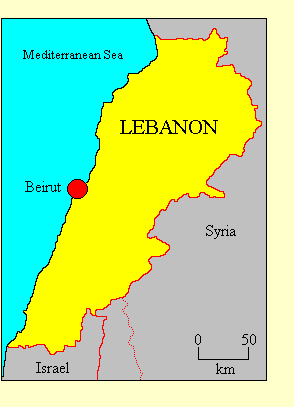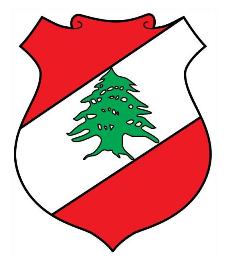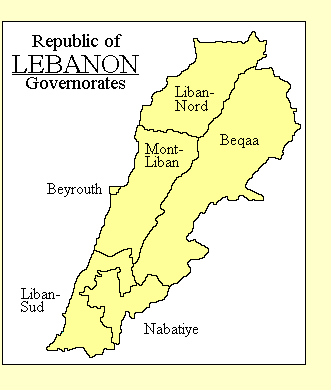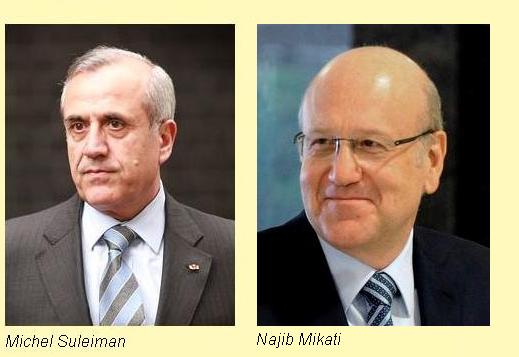

REPUBLIC OF LEBANON
• Official name: Al-Jumhuriyah al-Lubnaniyah (Republic of Lebanon)
• Location: West Asia
• International organisations: Arab League, Non-Aligned Movement, Organisation Internationale de la
Francophonie, Organisation of Islamic Conference, United Nations
• Borders: Israel, Syria
• Coastline: Mediterranean Sea
• Land area: 10,400 Km2
• Population: 4,200,000
• Annual GDP (PPP) per capita: US$13,100 (2009 CIA estimate). World ranking: 65
• Ethnicity: Officially, 95% of the population are identified as Arabs, but many
Christians identify only as Lebanese. There is a 4% Armenian minority and small
minorities of Europeans and Indians.
• Languages: Arabic is the official language and is almost universally used. French
is used among the Christian population, but is losing ground to English in business
and communications.
• Religion: There has been no religious census in Lebanon since 1932, but current
estimates are: Moslem 54% (Shi'a 33%, Sunni 21%), Christian 39% (Maronite Catholic
22%, Orthodox and others 17%), Druze 6%.
• Form of government: Parliamentary republic. Lebanon is divided into six
governorates.
• Capital: Beirut (Beyrouth)
• Constitution: The
Constitution of the Republic of Lebanon came into effect on 23 May 1926.
It has been amended several times.
• Head of state: The President, chosen by the legislature for a
six-year term. By convention, the President is always a Maronite Christian. President
Michel Suleiman
took office on 25 May 2008.

• Head of government: The Prime Minister, appointed by the President. The
Prime Minister is the leader of the largest party in the legislature and
is accountable to it. By convention, the Prime Minister is always a Sunni Moslem.
• Legislature: Lebanon has a unicameral legislature, the
Chamber of Deputies (Majlis al-Nuwab),
which has 128 members elected for four-year terms from electorates which correspond
to religious communities. According to Lebanon's
complex
election law, the various religious communities are represented proportionally.
The Constitution, however, specifies that
there must be equal numbers of Moslems and Christians in the legislature, which
means that Moslems are significantly under-represented. By convention, the Speaker of
the Chamber is always a Shi'a Moslem.
• Electoral authority: Elections Lebanon
administers national elections.
• Freedom House 2011 rating: Political Rights 5, Civil Liberties 3
• Transparency International Corruption Index: 25% (127 of 178 countries rated)
• Reporters Without Borders Press Freedom 2010 Index: 79.5% (78 of 178 countries rated)
• Heritage Foundation Economic Freedom 2010 Index: 60.1% (89 of 179 countries rated)
Political history
The key fact of Lebanese history is that it is the only area of the Middle East
which remained substantially Christian after the Arab conquest of the 7th century.
When the area was conquered by the Ottomans in 1515, the Christian communities
retained substantial autonomy. In 1867 the Ottoman government agreed to give Lebanon regional
autonomy under a Christian governor.
The French occupied Lebanon on the collapse of the Ottoman Empire in 1918, and
in 1923 "Greater Lebanon," including territory transferred from Syria, became a League
of Nations mandate under French administration. This enlargement weakened the
Christian character of Lebanon. The 1926 Constitution established the principle of
equal representation for Christians and Moslems. A 1936 treaty
agreed to French rule for 25 years, but this was aborted by the French defeat of 1940.
Lebanon became independent under Allied protection in 1943.
Since independence the proportion of Moslems in Lebanon has steadily increased, due to their
higher birthrate and to Christian emigration. An additional complication has been the large number of
Palestinian refugees who entered Lebanon in 1948. Sectarian tensions to a major political crisis in 1957,
during which American troops were called in to restore order.

In 1975 fighting broke out between Maronite militias and the Palestinians,
which led rapidly to a full-scale civil war in which most of the country was devastated.
Parts of Lebanon were occupied by Syria, and the south was occupied by Israel. In 1982
there was an Israeli invasion. The war was eventually ended by the Ta'if Accord of
1989. The Accord allows for a transition to a non-sectarian democratic government, but
little progress has been made in this direction, and the sectarian basis of politics
has been retained.
In 2000 the Israelis withdrew from southern Lebanon, but Syrian domination of the Muslim
areas and of the Lebanese state continued - Syria has never really accepted Lebanese independence,
and the Assad regime came to regard Lebanon as a Syrian dependency. When Prime Minister Rafiq
Hariri challenged Syrian dominance in 2005, he was assassinated by Syrian agents. This triggered
the "Cedar revolution" which ended in the forced withdrawal of Syrian forces and the installation
of an anti-Syrian coalition government led by Fouad Siniora. The 2005 elections gave the
anti-Syrian coalition a majority in the legislature, and this was confirmed at the 2009
elections. After these election Hariri's son Saad Hariri became Prime Minister. Hariri's government collapsed
with the withdrawal of several ministers in January 2011, apparently as a result of renewed Syrian interference.
The President then nominated a pro-Syrian
Sunni businessman, Najib Mikati, to be Prime Minister.
In 2007 there was an agreement to reform Lebanon's antiquated and divisive religion-based
electoral system, but this was not implemented before the 2009 elections. One consequence of this is
that Lebanon has no national political parties, and most members of the
legislature represent sectarian, regional or family interests. The anti-Syrian coalition, the
March 14 Alliance, is a loose coalition of nine sectarian and
ethnic parties, of which the largest are the Sunni Moslem
Movement of the Future,
led by Saad Hariri, and the Christian Lebanese Forces.
The pro-Syrian alliance is dominated by the Shi'a parties,
Amal and Hezbollah,
and the Christian Free Patriotic Movement.
Freedom House's 2011
report on Lebanon says:
"Lebanonis not an electoral democracy. Although the 2009 parliamentary elections were conducted peacefully and
judged to be free and fair in some respects, vote buying was reported to be rampant, and the electoral framework
retained a number of fundamental structural flaws linked to the country's sectarian political system...
The sectarian political system and the powerful role of foreign patrons effectively limits the accountability of
elected officials to the public at large. Political and bureaucratic corruption is widespread...
Lebanon has a long tradition of press freedom, though nearly all media outlets have ties to political groups.
There are seven privately owned television stations and dozens of privately owned radio and print outlets that
reflect a range of views.... Rights to freedom of association and assembly are generally unrestricted. On several
occasions in recent years, hundreds of thousands of Lebanese have rallied in favor of or in opposition to the
government... The judiciary is ostensibly independent, but it is subject to heavy political influence in practice."
Updated November 2011
|

